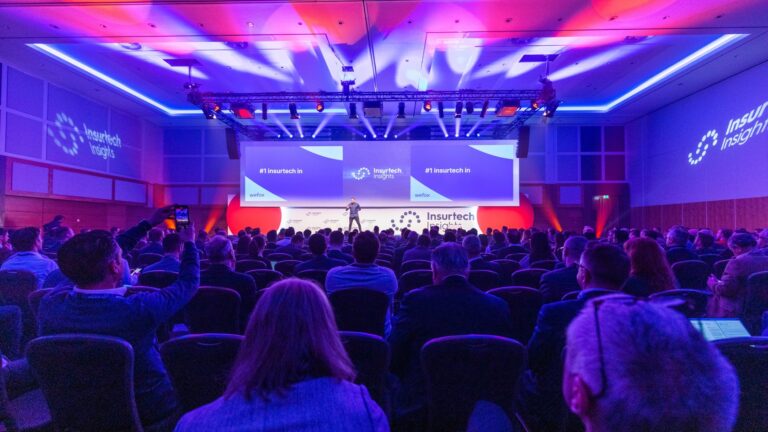Insurtech Insights Europe, held in London, United Kingdom, earlier this year, was a vibrant convergence of industry experts, offering a melting pot of ideas and a platform to showcase the latest innovations. As attendees and speakers, the Earnix team gleaned invaluable insights and experiences from this dynamic event. Here’s what we learned:
1. Progressive Conversations Steering Industry Transformation
The event underscored the transformative power of cutting-edge technologies such as AI, machine learning, blockchain, and data analytics in reshaping the insurance value chain. With an impressive lineup of speakers, including our own CTO Erez Barak, attendees were exposed to novel perspectives and debates progressing the conversation around the groundbreaking advancements our industry is witnessing. These discussions not only challenged conventional thinking but also provided a glimpse into future trends, equipping participants with invaluable ideas and knowledge poised to drive innovation within their organisations.
In speaking with delegates, it became clear that AI and machine learning are redefining how insurers assess risk, underwrite policies, and engage with customers. Advanced algorithms are enabling more precise risk modeling and pricing, enhancing the customer experience through personalised insurance products and services. At the same time, Data analytics is empowering insurers to leverage vast amounts of data for deeper insights and more informed decision-making.
For instance, delegates I spoke with highlighted successful implementations of machine learning models in predicting claim likelihoods and detecting fraud with high accuracy, thus minimising losses and optimising the claims management process. These conversations reinforced the notion that integrating these technologies is no longer a future consideration but a current necessity for staying competitive in the market.
2. Synthetic Data: A Game Changer in Specialty Insurance
One of the standout themes at the conference for me was the potential of synthetic data in revolutionising the specialty insurance market. In particular, the digital transformation of the London market’s complex specialty lines has only just begun, and while it is not a one-size-fits-all solution, synthetic data, coupled with AI, machine learning, and advanced analytics, holds promise for addressing various challenges in specialty insurance.
Specialty insurance involves unique and complex risks that are often difficult to model due to limited historical data. Synthetic data, which is artificially generated rather than obtained from real-world events, can fill these gaps. This type of data is particularly valuable in scenarios where real data is scarce, incomplete, or subject to privacy regulations. By generating realistic and representative data sets, insurers can train and test their AI and ML models more effectively, enabling robust performance in real-world applications.
Conversations with industry peers revealed several practical applications of synthetic data. For example, it can help insurers better understand rare but high-impact events, such as natural disasters or large-scale cyberattacks, by providing a sufficient volume of training data. This enables the development of more accurate predictive models and risk assessment tools. Additionally, synthetic data can enhance privacy and security by eliminating the need to use actual customer data.
3. A Call to Action: Embracing Ethics in AI
As we continue to harness the power of synthetic data, predictive analytics and machine learning, the importance of ethical AI cannot be overstated. The event highlighted the complex landscape of fairness and ethics in AI, and discussions with delegates more often than not emphasised our collective responsibility to creating AI systems with equal opportunities and outcomes across different groups, regardless of race, gender, age, or other sensitive attributes.

Fairness in ML is about mitigating biases and promoting fairness in decision-making processes. Achieving fairness involves creating algorithms that make unbiased decisions, devoid of systematic discrimination based on attributes like gender, race, or age.
This commitment to fairness extends to mitigating disadvantages faced by individuals or groups due to automated decision-making processes. Various metrics, including demographic parity, equal opportunity, predictive equality, equalised odds, individual fairness, and calibration, provide a comprehensive framework for assessing fairness, each addressing different aspects of unbiased decision-making.
At Earnix, we are deeply committed to the cause of steering AI development toward ethical and equitable practices. We believe best practice involves deploying a multifaceted approach to measuring fairness, using metrics such as demographic parity, equal opportunity, predictive equality, equalised odds, individual fairness, and calibration.
My conversations about the challenges and opportunities around developing an ethical compass for AI-powered models deployed in insurance were, for me, the key takeaways from the conference. As an industry, we are not just building models; we are nurturing trust and fostering inclusivity. We are not just predicting outcomes; we are shaping a future where technology amplifies justice instead of undermining it.
The team at Earnix extends our thanks to the organisers for orchestrating such a progressive and enriching event. Insurtech Insights Europe 2024 was a catalyst for driving innovation, fostering ethical practices, and shaping the future of insurance. Until next time!

About the author: Adrian Coupland, Head of EMEA at Earnix, has over 25 years of experience in sales and marketing in the insurance industry. He held multiple positions at SSP Limited over his 17-year tenure. His most recent role was as Customer and Marketing Director. With his background advising the insurance sector on the value of adopting data analytics, AI-driven rating capabilities, and telematics strategies, he has led insurers and brokers to operate more efficiently.









